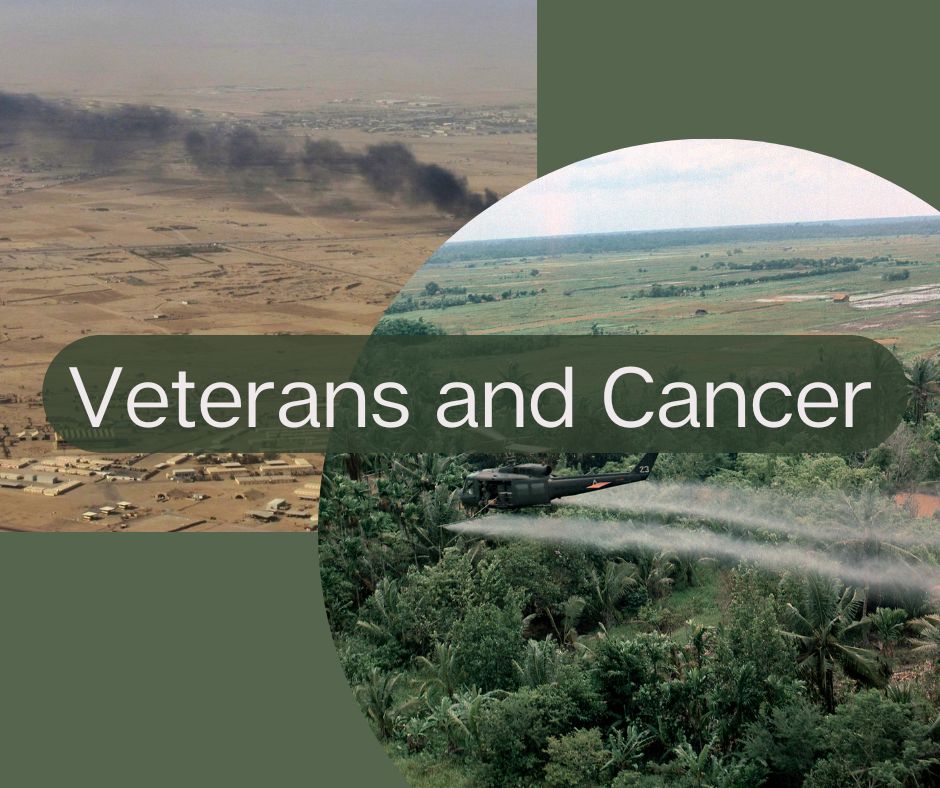Veterans and Cancer: Honoring Our Promise
Veterans face many possible illnesses and medical conditions due to their service. These can range from disabilities like arthritis, tinnitus, and other annoying problems to deadly conditions like cancer. When dealing with cancer specifically, there are things that Veterans need to know. Many cancers are presumptive to a Veteran’s service, but the type of cancer that is presumptive depends on where and when the Veteran was deployed.
Presumptive means that the VA has already determined there is a link between the agent (Agent Orange, Radiation, Toxic Exposure) and cancer. The Veteran must only submit evidence of a medical diagnosis and of their presence in the covered location sometime within the dates listed for each location.
Agent Orange
Agent Orange was a herbicide used by the U.S. military during the Vietnam War to clear vegetation and deny cover to enemy forces. It contained a dangerous chemical called dioxin, which has been linked to a variety of health problems, including certain types of cancer.
Agent Orange exposure applies to Veterans who were deployed to the following areas:
Exposure to Agent Orange in Vietnam
Vietnam
- Between January 9, 1962, and May 7, 1975, and for any length of time.
- Boots on the ground in Vietnam
- Aboard a U.S. military vessel in the inland waterways of Vietnam, or
- On a vessel operating within 12 nautical miles seaward from the demarcation line of the waters of Vietnam and Cambodia
Other Areas and Activities of Agent Orange Exposure
- Any U.S. or Royal Thai military base in Thailand from January 9, 1962, through June 30, 1976, or
- Laos from December 1, 1965, through September 30, 1969
- Cambodia at Mimot or Krek, Kampong Cham Province from April 16, 1969, through April 30, 1969
- Guam or American Samoa or in the territorial waters off Guam or American Samoa from January 9, 1962, through July 31, 1980
- Johnston Atoll or on a ship that called at Johnston Atoll from January 1, 1972, through September 30, 1977
- You served in or near the Korean DMZ for any length of time between September 1, 1967, and August 31, 1971, or
- You served on active duty in a regular Air Force unit location where a C-123 aircraft with traces of Agent Orange was assigned, and had repeated contact with this aircraft due to your flight, ground, or medical duties, or
- You were involved in transporting, testing, storing, or other uses of Agent Orange during your military service, or
- You were assigned as a Reservist to certain flight, ground, or medical crew duties at one of the locations listed here
The U.S. Department of Veterans Affairs (VA) recognizes certain diseases as being caused by exposure to Agent Orange, including several types of cancer.
Cancers Presumed to be Caused by Agent Orange:
- Bladder cancer
- Chronic B-cell leukemia
- Hodgkin’s disease
- Multiple myeloma
- Non-Hodgkin’s lymphoma
- Prostate cancer
- Respiratory cancers (including lung cancer)
- Some soft tissue sarcomas
Note: We don’t include osteosarcoma, chondrosarcoma, Kaposi’s sarcoma, or mesothelioma on our list of presumptive conditions.
NOTE: Do not let anyone tell you that your soft tissue sarcoma isn’t presumptive. IF it is a soft tissue sarcoma AND it is not one of the four listed above, it is presumptive and you should file a claim.
It’s important to note that in order to be eligible for disability benefits related to Agent Orange exposure, veterans must have served in a location where Agent Orange was used and have a diagnosed medical condition that is on the list of presumptive conditions. If you are diagnosed with any of these cancers (or any other presumed conditions) talk to a local Veteran Service Officer to file a claim.
Radiation-Exposed
The VA has a list of areas and activities that Veterans were deployed to and took part in which could have exposed them to radiation. If you or someone you know were present in one of these areas and are diagnosed with one of the below listed cancers, we advise you to see a local Veteran Service Officer and file a claim.
Areas and/or Activities of Radiation Exposure
- You were part of atmospheric nuclear weapons testing
- You served in the postwar occupation of Hiroshima or Nagasaki
- You were a prisoner of war (POW) in Japan
- You did tasks like those of a Department of Energy (DOE) employee that make them a member of the Special Exposure Cohort (For more details, check 42 U.S.C. 7384L(14))
- You were part of underground nuclear weapons testing at Amchitka Island, Alaska, or
- You were assigned to a gaseous diffusion plant at Paducah, Kentucky, or
- You were assigned to a gaseous diffusion plant at Portsmouth, Ohio, or
- You were assigned to a gaseous diffusion plant at Area K-25 at Oak Ridge, Tennessee
- Cleanup of Enewetak Atoll, from January 1, 1977, through December 31, 1980
- Cleanup of the Air Force B-52 bomber carrying nuclear weapons off the coast of Palomares, Spain, from January 17, 1966, through March 31, 1967
- Response to the fire onboard an Air Force B-52 bomber carrying nuclear weapons near Thule Air Force Base in Greenland from January 21, 1968, to September 25, 1968
The following listed Cancers are considered presumptive of radiation exposure.
Cancers Presumed by Radiation
- Cancers of the bile ducts, bone, brain, breast, colon, esophagus, gall bladder, liver (primary site, but not if cirrhosis or hepatitis B is indicated), lung (including bronchiolo-alveolar cancer), pancreas, pharynx, ovary, salivary gland, small intestine, stomach, thyroid, urinary tract (kidney/renal, pelvis, urinary bladder, and urethra)
- Leukemia (except chronic lymphocytic leukemia)
- Lymphomas (except Hodgkin’s disease)
- Multiple myeloma (cancer of plasma cells)
PACT Act
The Honoring Our Promise to Address Comprehensive Toxics (Honoring Our PACT) Act is a piece of legislation that was signed into law in the United States in 2022. The law includes several provisions aimed at improving healthcare and benefits for veterans, including those with cancer.
The Honoring Our PACT Act expands presumptions for service connection for veterans exposed to toxic substances, including Agent Orange, radiation, and airborne hazards such as those found in burn pits. This means that veterans who were exposed to these substances and later develop certain diseases, including certain types of cancer, may be eligible for disability benefits and other forms of healthcare and support.
Gulf War Era Veterans who were deployed to any of these areas have been determined by the VA to have been exposed to toxic materials.
Locations
On or after September 11, 2001, in any of these locations:
- Afghanistan
- Djibouti
- Egypt
- Jordan
- Lebanon
- Syria
- Uzbekistan
- Yemen
- The airspace above any of these locations
On or after August 2, 1990, in any of these locations:
- Bahrain
- Iraq
- Kuwait
- Oman
- Qatar
- Saudi Arabia
- Somalia
- The United Arab Emirates (UAE)
- The airspace above any of these locations
Cancers covered under PACT Act
The specific types of cancer that may be covered under the Honoring Our PACT Act include:
- Brain, head, neck, and nervous system cancers
- Gastrointestinal cancers
- Kidney cancers
- Lymphomas
- Melanoma
- Pancreatic cancers
- Reproductive cancers
- Respiratory cancers
NOTE: The above identifies the portion of the body where the cancers are located. Please see the linked webpage for a fuller list of cancers the VA considers presumptive.
It’s important to note that in order to be eligible for benefits under the Honoring Our PACT Act, veterans must have been exposed to toxic substances during their military service and have a diagnosed medical condition that is on the list of presumptive conditions. If you or someone you know has been diagnosed with one of the covered cancers and were deployed to one of the aforementioned areas, we advise seeking the assistance of your local Veteran Service Officer.
Please, if you are a Veteran and have been diagnosed with a cancer, talk to your local VSO. They can advise you and help you to file a claim with the VA to get the compensation to help your family.
As always, if you have any comments or questions you can drop them below or email us at info@nwavet.org.







